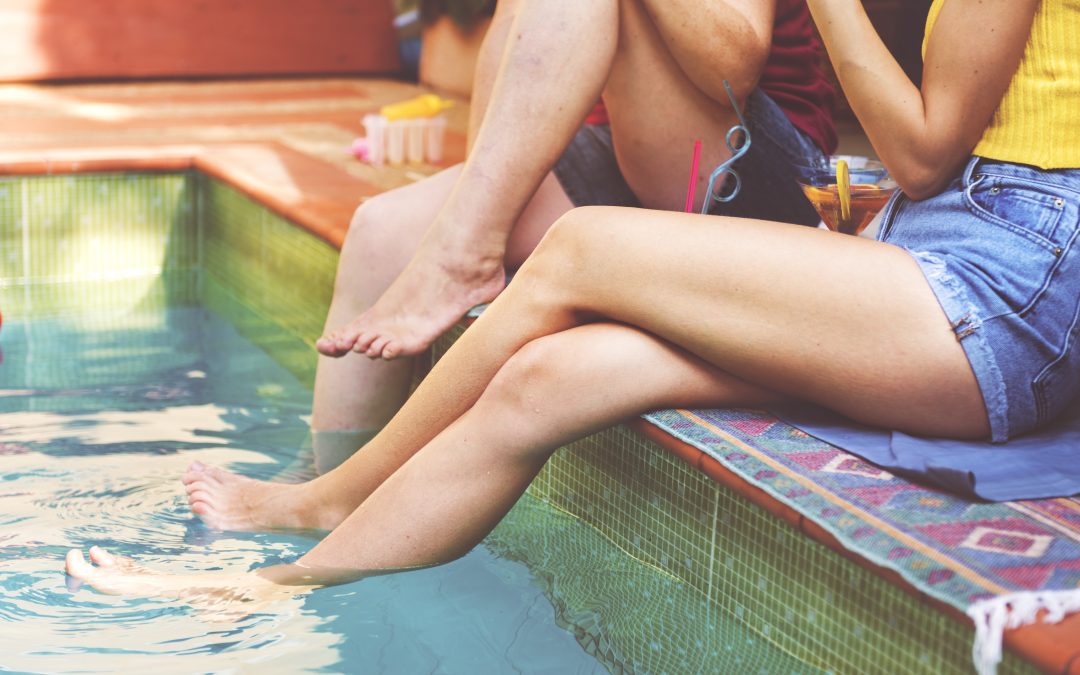We’ve heard them all before. Shouted by the well-meaning but ill-informed folks who hang around every pool, these myths have been floating around for a long time. Don’t worry—we’re here to clear things up so you can enjoy your swim session without all the anxiety.
“I can smell the chlorine—there’s too much!”
Chlorine (wrongly) gets much of the blame for lots of things in the pool community, as you’ll read. It may seem counterintuitive, but the smell of chlorine in a pool isn’t because there’s too much—it’s because there’s not enough. Chlorine is used in pools to keep bacteria and other harmful contaminants at bay. When it’s added to an unclean pool, the chlorine reacts with the bacteria and creates chloramine, which is then released into the air and is responsible for that distinctive chlorine smell. That smell means that the chlorine is no longer in the water killing bacteria—it’s in the air now—and it means you need to add more chlorine.
“Chlorine will turn your hair green!”
No, it sure won’t! While you can certainly get green hair from a swimming pool, it’s not from the chlorine—at least, not by itself. Many pools use chemical treatments called algaecides to keep algae from growing, and some of those algaecides are copper based. According to UCSB Material Research lab ,When the copper in these algaecides meets chlorine, the copper oxidizes and bonds to the proteins in your hair, which can turn you hair green. Blondes and those with dye-jobs are most susceptible to this discoloration, but it can easily be reversed with special shampoo and conditioner.
“Chlorine will burn your eyes!”
Once again—nope! This time, it’s the pool’s overall pH balance—not the presence of chlorine itself—that causes the trouble. pH is the measure of acidity or alkalinity of a solution (in this case, your pool) along a scale of 0–14. A pH below 7 means the solution is acidic, and a pH above 7 means it’s alkali (or basic). Pools are best kept between 7.2 and 7.8 pH, and anything outside of this range can cause eye irritation, including redness and burning.
“Don’t pee in the pool—the water will turn blue!”
Whoever started this one has been having a good laugh about it for a long time now. It was probably thought up to keep kids from peeing all up in the pool, but that doesn’t stop loads of people from believing it could happen to them. The ugly truth is there’s probably urine in almost every pool you’ve been in; however, urine is sterile (albeit gross), and the chemical cocktail that is your swimming pool will keep you completely clean and safe.
“Wait an hour to swim after eating or you’ll get cramps!”
Perhaps the most perpetuated pool rule is to wait an hour after eating before going swimming. This one at least has a hint of truth to it, but it’s still a wildly overstated myth. When your body is digesting food, it sends more blood to the digestive track than it otherwise would to aid with digestion. The diversion of blood to the digestive track leaves less for the rest of your body. If you overwork your muscles, you could cramp up, but most people are not exerting themselves in the pool to a level that would overwork your muscles. So, as long as you’re not swimming laps immediately after the big family barbecue, you’ll be just fine.
If you’re looking for more hot tips to pass along to your clients, check out more at our Splash Promotion blog. If you’re looking for clients to pass these hot tips along to, talk to us at Splash Promotion to find out how we can help you! Call 833-9-SPLASH (833-977-5274) or chat with one of our reps.

